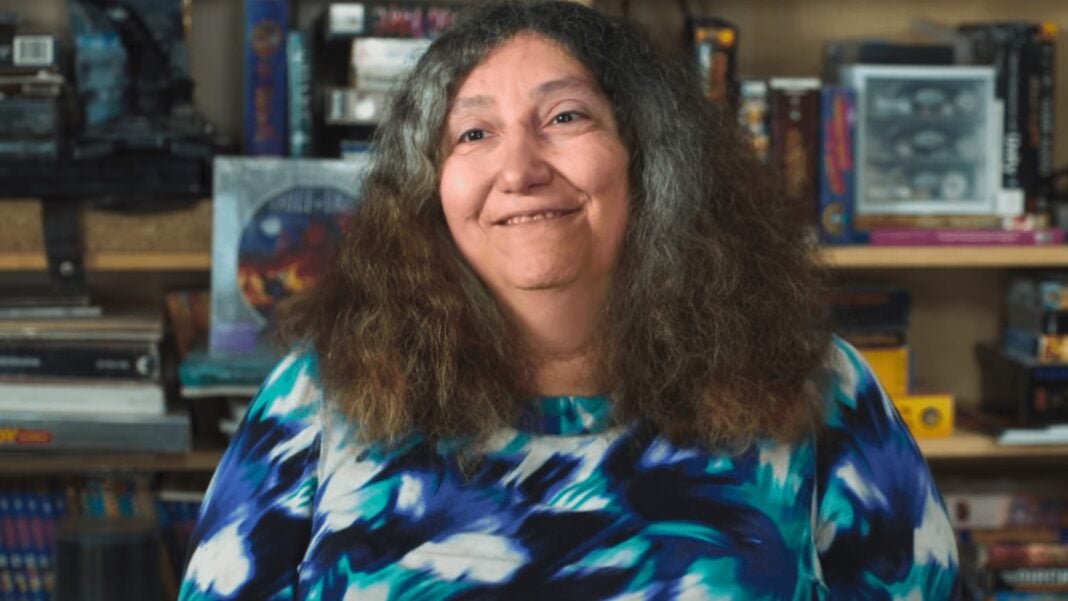Rebecca Ann Heineman, America’s first official video game champion, has died following a short battle with adenocarcinoma. Heineman, who was also an accomplished developer, webcomic creator, and archivist, was 62 years old.
Heineman announced her diagnosis in early October, and shared a GoFundMe to raise money for out-of-network treatments. Adenocarcinoma attacks the glandular cells inside of human organs, and its aggressiveness depends on the stage and spread of the disease. Heineman’s care team found cancer in her lungs and liver.
She posted a final update to her GFM on November 16, stating, “It’s time. According to my doctors. All further treatments are pointless. So, please donate so my kids can create a funeral worthy of my keyboard, Pixelbreaker! So I can make a worthy entrance for reuniting with my one true love, Jennell Jaquays.”
Heineman named her daughter, Cynthia, as the person making funeral arrangements. Cynthia is one of five children Heineman shared with her late spouse, Jacquays, who died in 2024.
Heineman’s death is sudden and tragic; she will be remembered as a video game pioneer who helped transform the industry. In addition to being inducted into the International Video Game Hall of Fame in 2017, she was awarded Gayming Mag’s 2025 Gayming Icon Award and served on the advisory board for the Videogame History Museum, as well as the GLAAD board of directors.
Heineman also featured prominently in the 2021 Netflix docuseries High Score, which chronicled early video game history.
How Rebecca Heineman became a video game pioneer
As a kid growing up in Whittier, California, Heineman — who couldn’t afford to purchase video games — taught herself how to copy cartridges for her Atari 2600, and pirated a large library. Eventually, she learned how to reverse-engineer the console’s code, which led to her becoming a programmer for Avalon Hill when she was just 16 years old.
She was offered the job after winning a regional qualifying round of the national Atari 2600 Space Invaders championship in 1980, going on to write for Electronic Games magazine and consulting for the book How to Master Video Games. Heineman revealed her reverse-engineering hack during the course of her writing and consultancy work.
Following Avalon Hill, Heineman worked for the developer Boone Corporation and developed Chuck Norris Superkicks and Robin Hood. When the company folded in 1983, she co-founded the legendary Interplay Productions with Brian Fargo, Jay Patel, and Troy Worrell, and designed titles including Dragon Wars, The Bard’s Tale III: Thief of Fate, The Tracer Sanction, and more.
After 12 years at Interplay, during which the company expanded to hundreds of employees, Heineman left and co-founded Logicware in 1995. She acted as the company’s lead programmer and chief technology officer, overseeing its console porting for titles like Killing Time.
Four years later, in 1999, Heineman founded yet another company, Contraband Entertainment. As CEO, Heineman led the team on Activision Anthology and Myth III: The Wolf Age, as well as the Mac OS ports for Baldur’s Gate II and Aliens vs. Predator. During her time at Contraband, she also consulted for Electronic Arts (EA), Ubisoft, Bloomberg L.P., Amazon, Microsoft, Sony, and more.
At Amazon, she was the Transgender Chair of the company’s LGBTQ+ group, Glamazon. Heineman began transitioning in 2003, and lived the rest of her life as a lesbian.
When Contraband shuttered in 2013, Heineman co-founded Olde Sküül with Jaquays, Maurine Starkey, and Susan Manley and became the company’s CEO. She was lead programmer on Battle Chess: Game of Kings.
Heineman’s non-video game projects
In addition to her work in video games, Heineman also created the multi-award-winning fanfiction webcomic Sailor Ranko, based on an earlier work written by Duncan Zillman that’s based on Sailor Moon and Ranma ½. She was also a software archivist.










A true talent and pioneer. RIP.
Comments are closed.